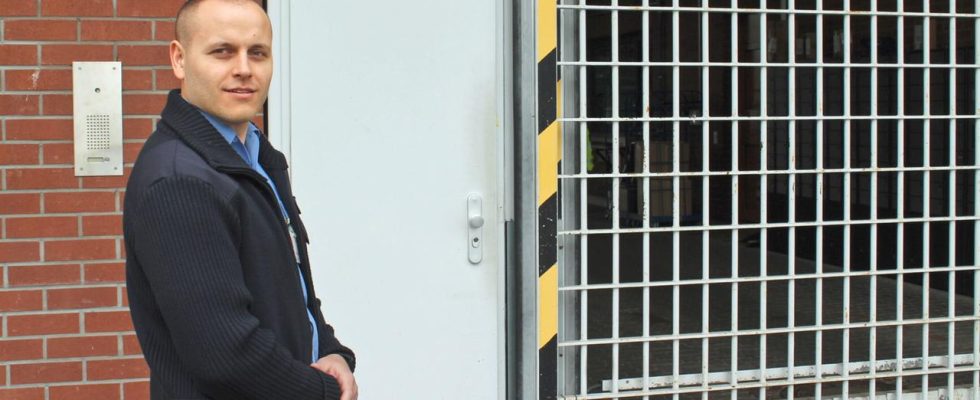How can the integration of foreigners succeed better? The responsible ministers in Wiesbaden are discussing this. Language skills and work are key – as the example of a 29-year-old shows.
“You never know what to expect,” says Adrian Covalciuc as he enters one of the five buildings at the Schifferstadt juvenile detention center in Rhineland-Palatinate. The house accommodates more than 50 prisoners in four residential groups. Each prisoner lives in a nine-square-metre room consisting of a bed, a table, a television and a small bathroom. Covalciuc looks after and supervises the prisoners in shift work.
His morning shift begins at 6 a.m. with the so-called live check. He goes from cell to cell and checks whether all the prisoners are there and how they are doing. Together with his colleagues, he also checks the cells for prohibited objects and makes sure that they are clean and tidy. Regulations and rules determine life in the juvenile detention center.
Covalciuc likes his job, even if it’s behind five-meter-high walls and barbed wire. After all, there are many green spaces, trees and even a pond with ducks on the twelve hectare prison grounds in Schifferstadt.
Workplace behind the high walls of the Schifferstadt juvenile detention center.
Good communication and sensitivity
“Everyone makes mistakes,” says the 29-year-old. He sees his task in helping the prisoners to live a life free of punishment in the future. Above all, this includes talking to them and helping them – for example when it comes to filling out forms for the authorities or accompanying them to school or to the workplace in the juvenile detention center. He and his colleagues take care of a regular daily routine and have to intervene in an emergency. Disputes or fights between inmates can occur from time to time.
Every prisoner is different, has a different personality, reacts differently, explains Covalciuc. Some are impulsive and need to be calmed down. A lot depends on the right communication and sensitivity: “You have to talk to them in such a way that they can understand you. Especially with the prisoners who don’t speak German. That’s also a challenge.” It’s about finding solutions to de-escalate, so that the daily routine and the rules of conduct are ultimately observed.
According to the prison management, around a third of the approximately 170 inmates have a migration background. More than 40 detainees are not German nationals.
Rocky road to law enforcement officers
Adrian Covalciuc completed his training as a prison officer in the JSA Schifferstadt three months ago with top marks – even though he came to Germany in 2018 without speaking a word of German himself. He acquired his knowledge of German himself during his 18-month apprenticeship. He probably wouldn’t have made it without the help of his aunt and uncle, who already lived in Germany, says Covalciuc. They would have helped him learn the language and settle in.
Ever since he was a child, it has been his dream to work for the police, says Covalciuc. At the age of 15 he attended a military school in Moldova. The three years there left a deep mark on him. He has learned to live according to clear guidelines and rules. After that, he decided to pursue a career in law enforcement. He finally got a place at the police academy in Romania through an exchange program and ended up in prison.
Adrian Covalciuc completed his training as a law enforcement officer at JSA Schifferstadt three months ago with top marks.
Internships in Romanian prisons
Covalciuc reports that his professional experience in prisons in Romania and the Republic of Moldova made it easier for him to get started in Germany. In Romania he did internships in various prisons, completed an apprenticeship for the higher civil service and studied law.
In the Republic of Moldova he also worked in adult prisons. It’s much tougher there than in German prisons, he explains. There, several prisoners are usually housed in a small cell. Very different from Schifferstadt, where there are only single cells.
In Romania he also learned that prisoners have to be treated with respect, no matter what they have done. Then the prisoners also respected you, says Covalciuc. “We are all human beings, whether prisoners or officials. If we treat each other with respect, then you get that back.” His work with the prisoners is always a difficult balancing act between closeness and distance, explains Covalciuc. If you allow too much closeness, the prisoner will perceive you as a friend or sidekick. With too much distance, you can’t have a good conversation and you can’t build trust.
Covalciuc feels comfortable with his work in the Schifferstadt juvenile detention center. He works there in a great team. He is convinced that integration can only succeed if people are willing and interested in getting involved. In addition, there must be offers of help: “If you want to achieve something in a foreign country, the first thing you have to do is learn the language. And then do everything you can to achieve your goal.”
Juvenile detention center in Schifferstadt
JSA Schifferstadt is the largest detention facility for juveniles and young adults in Rhineland-Palatinate. Prisoners between the ages of 14 and 21 are usually accommodated here. On average, they serve prison sentences of two to three years. The crimes range from simple theft to violent crimes and murder. About 170 criminals are currently being held in the JSA. The management of the institution is urgently looking for staff and specialists. According to deputy head Marina Maier, many positions in general enforcement are vacant.

